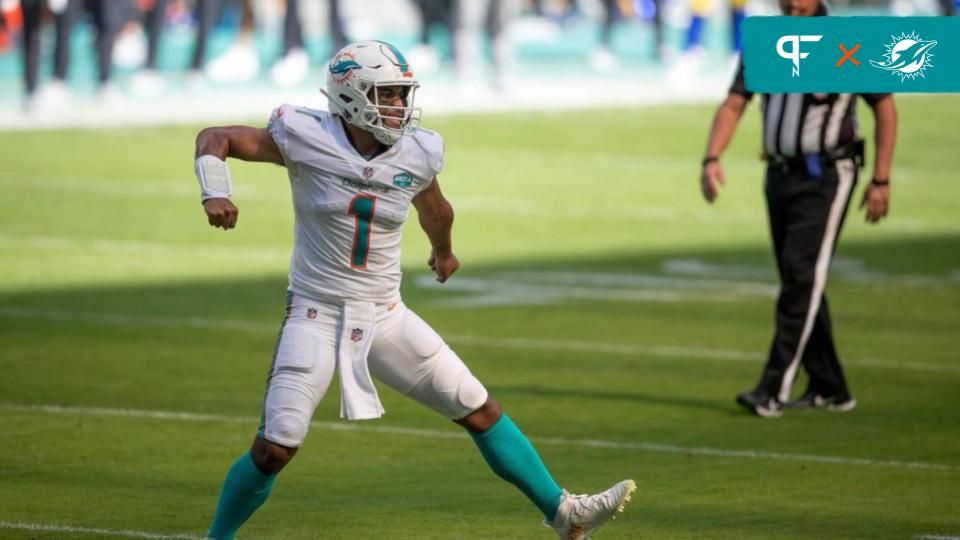MIAMI GARDENS, Fla. — Tua Tagovailoa is back, and so is his edge.
The Miami Dolphins quarterback, who is set to practice Wednesday and will probably play Sunday against the Arizona Cardinals, showed his salty side during his first news conference in weeks.
He’s clearly irritated about being again at the center of the national conversation about concussions in football.

Miami Dolphins’ Tua Tagovailoa Talks Concussion Risk
“I appreciate your concern,” Tagovailoa said when asked what he’d say to the thousands, if not millions, of people worried about his long-term health. “I really do. I love this game, and I love it to the death of me. That’s it.”
But just because Tua on Monday didn’t want to reveal much about the decision-making process that resulted in his return to football, don’t think he didn’t take his most recent concussion as seriously as he did his previous three.
Tagovailoa spent the last month traveling the country meeting with the nation’s top specialists, along with the team’s own doctors.
After multiple exams and consultations, Tua was told it was safe to return to football. He was never told he would be putting himself at any increased long-term risk by resuming his career.
They did, however, suggest extended rest to allow his brain to settle down. That’s why the Dolphins put him on injured reserve. It will ultimately be 45 days between Tagovailoa’s last game and his next, if he does indeed play this weekend.
So why did the Dolphins and Tagovailoa believe this was the right time to return?
“Specifically with concussions — but just any injury in general — just following the directive and the opinion of medical experts,” said Dolphins head coach Mike McDaniel.
“I think the reason why he’s coming back now is because the medical experts have deemed it safe for him to return. So I don’t mess with timelines or try to overcook or forecast. You lean on experts for matters of the career, and that’s what we’re doing here.”
Tagovailoa told reporters Monday that he’s been symptom-free since the day after the concussion, which occurred on Sept. 12.
So why did the Dolphins decide to put him on injured reserve, which kept him out four games (and five weeks, since his IR stint included Miami’s bye)?
Inside Dolphins’ Tua IR Decision
“The medical experts deemed that he would be best served with time,” McDaniel said. “In terms of the roster and equating what that timeline looked like, it was a little unknown.
“And so when the brain’s health will be determined by the time, you make that decision. Each concussion is unique to its own, but that’s why you have to really rely upon people that study the brain for a living, and that was the driving force.”
Tagovailoa acknowledged that the IR roster move was a result of “protecting myself from myself.”
That makes sense because everything Tagovailoa said Monday suggested he wanted to return to football as soon as possible.
He never considered retirement. He won’t wear a Guardian Cap, helmet padding that has shown to, in some instances, lower the risk of concussions, saying it was “a personal choice.”
“I think the brain is, there’s just a gray area when it comes to that,” Tagovailoa said. “If you do know that you’re gonna get long-term, you know, disease from it or if you’re not. I just think there’s a lot of gray with it. For me, this is what I love to do. This is what makes me happy, and I’m gonna do it. That’s it.”
Tua closed his news conference with this answer to a question about whether he’s putting himself at any more risk than normal by continuing to play:
“How much risk do we take when we get up in the morning to go drive to work? You get into a car crash maybe, I don’t know. Everything, I think, takes risk. So, to answer that question, every time we all suit up, we’re all taking a risk that we could potentially get hurt, whether it’s a concussion, a broken bone, anything.
“You get up off of the bed the wrong way, you potentially could risk you spraining your ankle. There’s just risk in any and everything. And I’m willing to play the odds. That’s it.”

